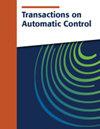分析动态环境游戏的耦合方法
IF 7
1区 计算机科学
Q1 AUTOMATION & CONTROL SYSTEMS
引用次数: 0
摘要
博弈学习理论广泛研究了代理在静态环境中通过优化固定效用函数对彼此做出动态反应的情况。然而,现实世界的环境是过去智能体选择的结果。不幸的是,能够丰富描述静态环境下游戏突发行为特征的分析技术却无法应对动态环境下的游戏。为了解决这个问题,我们开发了一个使用概率耦合的一般框架,将静态环境博弈的分析扩展到动态环境博弈。利用该方法,我们得到了具有最佳响应动力学和随机稳定性的传统的具有对数线性学习的纳什均衡的特征可以推广到动态环境对策的充分条件。通过对参考静态环境博弈进行传统分析,我们得到了动态博弈突现行为可以表征的条件。作为案例研究,我们提出了一个企业间网络威胁情报共享模型,该模型具有复杂历史依赖的动态环境。本文章由计算机程序翻译,如有差异,请以英文原文为准。
A Coupling Approach to Analyzing Games With Dynamic Environments
The theory of learning in games has extensively studied situations where agents respond dynamically to each other in a static environment by optimizing a fixed utility function. However, real-world environments evolve as a result of past agent choices. Unfortunately, the analysis techniques that enabled a rich characterization of the emergent behavior of games played in static environments fail to cope with games played in dynamic environments. To address this problem, we develop a general framework using probabilistic couplings to extend the analysis of static environment games to dynamic ones. Using this approach, we obtain sufficient conditions under which traditional characterizations of Nash equilibria with best response dynamics and stochastic stability with log-linear learning can be extended to dynamic environment games. We obtain conditions under which the emergent behavior of a dynamic game can be characterized by performing the traditional analysis on a reference static environment game. As a case study, we pose a model of cyber threat intelligence sharing between firms, which features a dynamic environment with complex history dependence.
求助全文
通过发布文献求助,成功后即可免费获取论文全文。
去求助
来源期刊

IEEE Transactions on Automatic Control
工程技术-工程:电子与电气
CiteScore
11.30
自引率
5.90%
发文量
824
审稿时长
9 months
期刊介绍:
In the IEEE Transactions on Automatic Control, the IEEE Control Systems Society publishes high-quality papers on the theory, design, and applications of control engineering. Two types of contributions are regularly considered:
1) Papers: Presentation of significant research, development, or application of control concepts.
2) Technical Notes and Correspondence: Brief technical notes, comments on published areas or established control topics, corrections to papers and notes published in the Transactions.
In addition, special papers (tutorials, surveys, and perspectives on the theory and applications of control systems topics) are solicited.
 求助内容:
求助内容: 应助结果提醒方式:
应助结果提醒方式:


